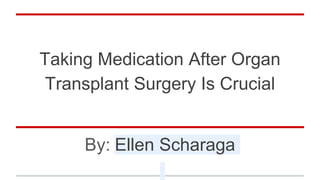Taking Medication After Organ Transplant Surgery Is Crucial
•Download as PPTX, PDF•
0 likes•6 views
Taking Medication After Organ Transplant Surgery Is Crucial
Report
Share
Report
Share

More Related Content
Similar to Taking Medication After Organ Transplant Surgery Is Crucial
Similar to Taking Medication After Organ Transplant Surgery Is Crucial (20)
Astragalus – A Miracle Herb That Protects DNA And Fights Disease

Astragalus – A Miracle Herb That Protects DNA And Fights Disease
Recently uploaded
Book Paid Powai Call Girls Mumbai 𖠋 9930245274 𖠋Low Budget Full Independent H...

Book Paid Powai Call Girls Mumbai 𖠋 9930245274 𖠋Low Budget Full Independent H...Call Girls in Nagpur High Profile
Recently uploaded (20)
VIP Service Call Girls Sindhi Colony 📳 7877925207 For 18+ VIP Call Girl At Th...

VIP Service Call Girls Sindhi Colony 📳 7877925207 For 18+ VIP Call Girl At Th...
Call Girls Ooty Just Call 8250077686 Top Class Call Girl Service Available

Call Girls Ooty Just Call 8250077686 Top Class Call Girl Service Available
Call Girls Dehradun Just Call 9907093804 Top Class Call Girl Service Available

Call Girls Dehradun Just Call 9907093804 Top Class Call Girl Service Available
Call Girls Jabalpur Just Call 8250077686 Top Class Call Girl Service Available

Call Girls Jabalpur Just Call 8250077686 Top Class Call Girl Service Available
All Time Service Available Call Girls Marine Drive 📳 9820252231 For 18+ VIP C...

All Time Service Available Call Girls Marine Drive 📳 9820252231 For 18+ VIP C...
Best Rate (Guwahati ) Call Girls Guwahati ⟟ 8617370543 ⟟ High Class Call Girl...

Best Rate (Guwahati ) Call Girls Guwahati ⟟ 8617370543 ⟟ High Class Call Girl...
(👑VVIP ISHAAN ) Russian Call Girls Service Navi Mumbai🖕9920874524🖕Independent...

(👑VVIP ISHAAN ) Russian Call Girls Service Navi Mumbai🖕9920874524🖕Independent...
Call Girls Bangalore Just Call 8250077686 Top Class Call Girl Service Available

Call Girls Bangalore Just Call 8250077686 Top Class Call Girl Service Available
Book Paid Powai Call Girls Mumbai 𖠋 9930245274 𖠋Low Budget Full Independent H...

Book Paid Powai Call Girls Mumbai 𖠋 9930245274 𖠋Low Budget Full Independent H...
Call Girls Gwalior Just Call 9907093804 Top Class Call Girl Service Available

Call Girls Gwalior Just Call 9907093804 Top Class Call Girl Service Available
Top Rated Hyderabad Call Girls Erragadda ⟟ 6297143586 ⟟ Call Me For Genuine ...

Top Rated Hyderabad Call Girls Erragadda ⟟ 6297143586 ⟟ Call Me For Genuine ...
Russian Escorts Girls Nehru Place ZINATHI 🔝9711199012 ☪ 24/7 Call Girls Delhi

Russian Escorts Girls Nehru Place ZINATHI 🔝9711199012 ☪ 24/7 Call Girls Delhi
Top Rated Bangalore Call Girls Mg Road ⟟ 9332606886 ⟟ Call Me For Genuine S...

Top Rated Bangalore Call Girls Mg Road ⟟ 9332606886 ⟟ Call Me For Genuine S...
Call Girls Tirupati Just Call 8250077686 Top Class Call Girl Service Available

Call Girls Tirupati Just Call 8250077686 Top Class Call Girl Service Available
Night 7k to 12k Navi Mumbai Call Girl Photo 👉 BOOK NOW 9833363713 👈 ♀️ night ...

Night 7k to 12k Navi Mumbai Call Girl Photo 👉 BOOK NOW 9833363713 👈 ♀️ night ...
Call Girls Horamavu WhatsApp Number 7001035870 Meeting With Bangalore Escorts

Call Girls Horamavu WhatsApp Number 7001035870 Meeting With Bangalore Escorts
Call Girls Coimbatore Just Call 9907093804 Top Class Call Girl Service Available

Call Girls Coimbatore Just Call 9907093804 Top Class Call Girl Service Available
Night 7k to 12k Chennai City Center Call Girls 👉👉 7427069034⭐⭐ 100% Genuine E...

Night 7k to 12k Chennai City Center Call Girls 👉👉 7427069034⭐⭐ 100% Genuine E...
Call Girls Cuttack Just Call 9907093804 Top Class Call Girl Service Available

Call Girls Cuttack Just Call 9907093804 Top Class Call Girl Service Available
Best Rate (Patna ) Call Girls Patna ⟟ 8617370543 ⟟ High Class Call Girl In 5 ...

Best Rate (Patna ) Call Girls Patna ⟟ 8617370543 ⟟ High Class Call Girl In 5 ...
Taking Medication After Organ Transplant Surgery Is Crucial
- 1. Taking Medication After Organ Transplant Surgery Is Crucial By: Ellen Scharaga
- 2. Taking Medication After Organ Transplant Surgery Is Crucial Ellen Scharaga is an operational consultant at Alegria Specialty Pharmacy in New York. At the firm, Ellen Scharaga facilitates the development and delivery of innovative medications to manage chronic conditions and support people who have undergone organ transplants.
- 3. Taking Medication After Organ Transplant Surgery Is Crucial People who’ve had organ transplants have to take medication for the rest of their lives. Specifically, they take immune system suppressing medication to prevent their bodies from rejecting the donated organs. The body’s immune system is naturally alert, seeking out foreign organisms for removal. In the case of donated organs, the immune system deems them foreign objects and treats them like germs. The result is organ rejection.
- 4. Taking Medication After Organ Transplant Surgery Is Crucial Immunosuppressing drugs suppress the immune system, enabling patients to live well with a donated organ. However, because patients have to take several drugs every day, keeping up can be daunting. Here are some tips to make it easier:
- 5. Taking Medication After Organ Transplant Surgery Is Crucial 1. Using pillboxes with daily or weekly doses that are set up beforehand and storing the medication in a cool dry place, away from children.
- 6. Taking Medication After Organ Transplant Surgery Is Crucial 2. Scheduling doses so that they coincide with daily activities such as eating, rushing, or going to bed. If not, an alarm clock or timer is handy to remind patients when to take medication.
- 7. Taking Medication After Organ Transplant Surgery Is Crucial 3. Monitoring medicine levels and making refill orders early.
- 8. Taking Medication After Organ Transplant Surgery Is Crucial 4. Never stop taking medication without the doctor’s approval.
